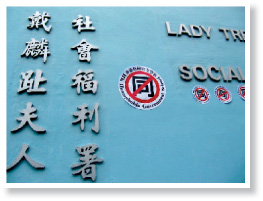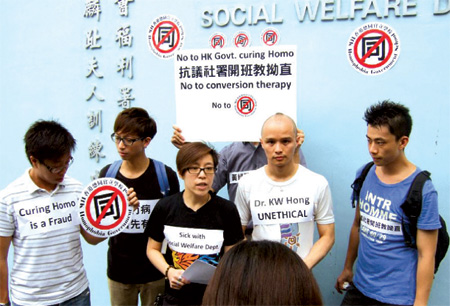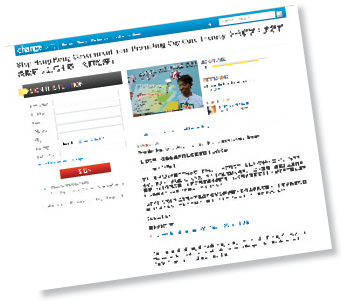The last straw?
Updated: 2011-08-02 07:10
By Elizabeth Kerr(HK Edition)
|
|||||||
|
Demonstrators protest outside the Social Welfare Department against the invitation of a controversial psychiatrist, Dr Hong Kwai-wah, to a seminar held for social workers. Provided to China Daily |

Hong Kong prides itself as a world-class city. But people into the lesbian, gay, bisexual and transgender lifestyle say the city lags far behind other world cities in its attitudes toward sexual preferences. Elizabeth Kerr reports.
About a year ago in this space, we asked the question of where Asia's World City's world-class Gay Pride celebrations were. The short answer was nowhere. Lesbian, gay, bisexual, and transgender (LGBT) activists argued the two communities needed to come together first. There was little interest from supporting authorities, but they were working on it. A year later, it appears there's a problem.
In June, global real estate advisory, Colliers International, released a statement suggesting Hong Kong potentially could have a global competitiveness issue on its hands because of rising rental rates, a shortage of international school places, and continuing air quality issues. It's the kind of news that makes the SAR's business-friendly government jittery, and occasionally prompts it to act.
In the same month Hong Kong made international headlines in another area of social concern - in AFP, the Singapore Straits Times, Bangkok Post, Miami Herald, Yahoo! News, and The Huffington Post, among others. The attention grew from a decision by the Hong Kong government to hire a controversial local psychiatrist, Dr Hong Kwai-wah, to conduct a seminar on dealing with LGBT youth struggling with their sexuality. The seminar was presented to staff of the Social Welfare Department (SWD). The controversy arose from the fact that Dr Hong, chairman of the New Creation Foundation, is widely considered a so-called conversion therapist, that is, one that counsels patients emphasizing a course of abandonment of their LGBT "lifestyle", with its focus on Christian dogma. Some might say, it's a fancy way of saying "praying out the gay". The government's decision to employ Dr Hong became widely viewed as the first government approval anywhere in the world of the controversial conversion therapy. Some called the decision "an embarrassing travesty". "No city or country in the world would organize conversion therapy training for social workers!" railed Connie Chan, chair of the Women Coalition of HKSAR.
Conversion therapy has been discredited by the World Health Organization (WHO) and the American Medical Association (AMA), among others. The American Psychological Association task force into conversion therapy concluded: "Compelling evidence of decreased same-sex sexual behavior and of engagement in sexual behavior with the other sex was rare. Thus, the results of scientifically valid research indicate that it is unlikely that individuals will be able to reduce same-sex attractions or increase other-sex sexual attractions through SOCE (conversion therapy)."
Cases were reported of patients being harmed, including losing all sexual feeling, while others suffered feelings of depression ranging from mild to severe.
Though the Hong Kong College of Psychiatrists has no official position yet, a formal statement is forthcoming. This is not the first time the government has sanctioned practices widely seen as questionable for public services. In 2005, the Education and Manpower Bureau awarded a contract to educate teachers on human rights according to the teachings of the fundamentalist Christian Society for Truth and Light, even though groups like Amnesty International had pitched for the job.
Hong Kong has been relatively low-key in its discriminatory practices. The local community hasn't been inspired to the kind of civil action seen at the landmark Stonewall riots in 1969. Nevertheless, in a globalized climate in which the business community spends vast amount of money, time and energy on diversity policies, it seems counter to the global trend that the Hong Kong government should spent money on programs that directly conflict with diversity programs.
The SWD argues that plurality and balance were the motivations for choosing Dr Hong to conduct the seminar and that conversion therapy was never on the agenda.
|
Petitioners set up web pages on the Internet to raise objections to what they believe is the government promotion of "gay cure therapy". |
"We recognize that knowledge from multiple perspectives is essential for social workers to make professional, comprehensive and independent assessment on their cases and to address the specific needs of individual clients," says Winnie Wong, a SWD information officer. Wong goes on to stress that participants in similar workshops included speakers from "local universities, the Law Society of Hong Kong, Rainbow of Hong Kong (sic), and Women Coalition of HKSAR."
Tommy Jai of Rainbow Action Hong Kong isn't buying it. "Does balance include pseudo-science? Does it include violating the codes of practice for social workers? Does it include violating human rights?" Jai also claims attendees at the lecture have notes on conversion therapy.
Dr Hong told the Apple Daily he covered the topic. In his defense, Hong is adamant his treatment is not meant to be reparative, and that human sexuality is neither black nor white. "I give counseling to all types of homosexuals (whether they are happy with their homosexual lifestyle or not) at my clinic," explains Hong. "I respect those who wish a homosexual life, but I also respect those who wish to escape from it. To me, diversity is to fight for this minority group with special needs - for their basic human rights and to let the community know they exist because they have no voice in society, where the pro-gay community does not necessarily represent them."
Dr Ng Man-lun, a psychiatrist and sexologist at Hong Kong University's Family Institute, says there is no controversy, as the positions of WHO and the AMA imply. "If scientists all over the world tell you that the earth is round, but some people insist on believing that it's flat, is this a controversy? It is a shame that SWD invited Dr Hong and that Dr Hong is a qualified psychiatrist." Asked if this case provides evidence that Hong Kong remains heavily influenced by homophobia, Ng bluntly states: "Yes."
"I would agree gay-bashing is rare, but that doesn't mean the environment is good. Discrimination is very, very serious. We still don't have discrimination legislation for sexual orientation; people are still getting fired; people get kicked out of home," says Jai. "The LGBT community is unable to access public housing for cohabitation, and that's 30 percent of the community. That's big enough for us to push for our rights and freedoms. Violence is not the only way. Everyday life is suffocating for us."
Nigel Collett, secretary of the Tongzhi Community Joint Meeting (TCJM), agrees to a degree, but quickly points out the responses in the media and directly to the government have been far more intense than in the past. "I don't think it's quite as big as Stonewall, but it's having a bigger effect than anyone expected to start with because the government's been made to seem very foolish internationally. They really hate that."
Hong Kong prides itself on its welcoming business environment, and positions itself as a cosmopolitan city. The idea of major multi-nationals rethinking operating in Hong Kong when a chunk of its talent is LGBT doesn't seem to be inspiring angry words from Central. Almost every business organization contacted for this story could not or would not respond to requests for a comment.
"The business community's interests here are badly affected by all of this in many ways," theorizes Collett. "(Talent) with a partner coming to Hong Kong will look at that and think: 'Do I really want to go to a place like that?' And it's bound to make things worse for them. And then there's the idea of them paying for it." For its professed sophistication, Hong Kong still has trouble dealing with its LGBT population: homosexuality has only been decriminalized since 1991, and anti-discrimination legislation for LGBT residents seriously lags behind the rest of the world. While baby steps have been taken (the city hosts Mr Gay Hong Kong, and a major Pride event appears to be brewing), things would move faster with help from business. "As you mention it is the financial world that will make things move the fastest. Large banks like Goldman Sachs have diversity departments that are loud and clear about their wanting the government to recognize their LGBT employees," says Betty Grisoni, co-founder of the lesbian-focused Les Peches. She calls Hong's appointment an "incredible setback" for Hong Kong's LGBT community, and simply "upsetting" for all.
"Using MNCs' (multinational corporations) tax money to hire a conversion therapist to 'cure homosexuality' certainly does not resonate with corporations striving to attract the best talent, including gays and lesbians," warns lawyer, lecturer, and Diversity Factor principal consultant Roddy Shaw. When Hong Kong can make Singapore look more progressive (the Lion City has hosted major Pride events in the last few years), the world city status is precarious at best. Like poor air and high rents, "bad decisions that hamper LGBT inclusion could harm Hong Kong as a city of choice for MNCs". Dozens of Fortune-ranked companies that also rate high on inclusionary practices have presences in Hong Kong. "It is time the government made some business sense by welcoming, rather than alienating, all contributing citizens into the society," Shaw states.
(HK Edition 08/02/2011 page4)

